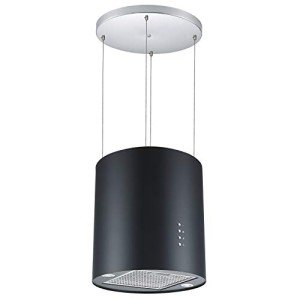5 Reasons Island Cooker Hoods Is Actually A Beneficial Thing
페이지 정보
작성자 Benedict 댓글 0건 조회 4회 작성일 25-05-20 01:23본문

The Ultimate Guide to Island Cooker Hoods
Island Extractor Fan Kitchen cooker hoods are essential in contemporary kitchen design, serving both functional requirements and aesthetic preferences. As cooking areas progress into social centers, the significance of efficient ventilation and stylish appliances has never ever been more noticable. This post will explore the features, advantages, types, Island Extractor Fan Kitchen setup considerations, and upkeep of island cooker hoods.
What is an Island Cooker Hood?
An island cooker hood is a ventilation system suspended above a kitchen island cooktop. Unlike wall-mounted hoods, these gadgets are created for open designs where the cooktop is installed on an island, enabling an unobstructed view and a classy cooking experience. These hoods can successfully remove smoke, odors, and airborne grease, guaranteeing the kitchen stays fresh and without pollutants.

Key Features of Island Cooker Hoods
island hood extractor cooker hoods come with numerous features that improve their performance and visual appeal. Below is a comprehensive list of some common features:
- Suction Power: Measured in cubic feet per minute (CFM), this suggests the volume of air the hood can efficiently filter.
- Noise Level: The noise produced by the motor, generally measured in sones or decibels.
- Lighting: Integrated lighting to illuminate the cooking area listed below.
- Filters: Charcoal or metal filters that can trap grease and odors.
- Ducted or Ductless Options: Ducted hoods vent air outside the home, while ductless hoods filter and recirculate the air back into the kitchen.
- Control Options: Touch controls, push-button controls, or smart device compatibility for simple performance.
Advantages of Installing an Island Cooker Hood
Investing in an island cooker hood features a wide variety of benefits:
- Effective Ventilation: Ensures the kitchen remains smoke and odor-free.
- Visual Appeal: Adds an elegant centerpiece above the kitchen island.
- Increased Property Value: A modern-day setup can boost the general worth of a home.
- Improved Air Quality: Regularly venting out heat and moisture promotes a healthier cooking environment.
Types of Island Cooker Hoods
When selecting an island cooker hood, it's vital to consider the type that best suits the kitchen's requirements. Here's a breakdown of the different types readily available on the marketplace:
Ducted Island Hoods:
- Vents air outside through ducts.
- More efficient in eliminating grease and smoke.
Ductless Island Hoods:
- Filters air within and recirculates it back into the kitchen.
- Simpler to install given that no ductwork is needed.
Convertible Island Hoods:
- Can run as either ducted or ductless depending on the installation needs.
Wall-Mounted Island Hoods:
- Attached to the wall instead of hanging straight over the island.
Chimney Style Island Hoods:
- Feature a chimney-like structure and supply high suction power.
Setup Considerations
Installing an island cooker hood requires mindful planning and execution. Here are some vital considerations:
- Height: The hood must be installed at least 30 to 36 inches above the cooktop for optimal efficiency and security.
- Ductwork: For ducted hoods, ensure appropriate ducting and venting work to prevent any air leaks.
- Electrical Requirements: Check regional building codes for any electrical wiring and electrical installation standards.
- Space: Measure the kitchen island area to choose the properly sized hood.
Maintenance Tips for Island Cooker Hoods
Routine maintenance of island cooker hoods is essential for ensuring their efficiency and durability. Here are some upkeep suggestions:
- Clean Filters Regularly: Depending on usage, clean or change filters every 1 to 3 months.
- Wipe the Surface: Clean the exterior and interior of the hood with moderate cleaning agents to prevent grease accumulation.
- Inspect for Blockages: Ensure that ducts are clear of obstructions.
- Service the Motor: Periodically inspect the motor and demand expert servicing if any unusual noises are spotted.
Regularly Asked Questions (FAQs)
1. How much CFM does an island cooker hood require?
The CFM requirement usually depends upon the size of the cooktop and the cooking design. As a general guideline, prepare for 100 CFM for every 12 inches of cooking surface area.
2. Can I set up a ductless island cooker hood if I have inadequate ductwork?
Yes, ductless island hoods are an excellent alternative if ductwork is not viable. Ensure you utilize premium carbon filters extractor fans for kitchen islands effective odor and grease removal.
3. How do I understand if my island cooker hood is correctly set up?
Verify that there is no extreme noise, the easy work, and the hood efficiently eliminates smoke and odors when in operation, suggesting appropriate setup and performance.
4. How typically should I clean my island cooker hood uk cooker hood?
Requirement practice suggests cleaning up the filters monthly and carrying out a much deeper clean of the exterior and interior every three to 6 months.
5. Are there energy-efficient alternatives offered for island cooker hoods?
Yes, there are energy-efficient island cooker hoods that utilize sophisticated technology to lessen energy usage while maintaining strong ventilation abilities.
Island cooker hoods play a crucial role in modern-day kitchen areas, offering reliable ventilation solutions while enhancing the kitchen's visual appeal. They are available in various designs and functions, dealing with diverse needs and choices. With correct setup and routine upkeep, these appliances can substantially improve air quality, add to healthier cooking environments, and raise the total look of the kitchen area. By thinking about durability and performance, house owners can make informed options that line up with their cooking habits and kitchen designs.
댓글목록
등록된 댓글이 없습니다.